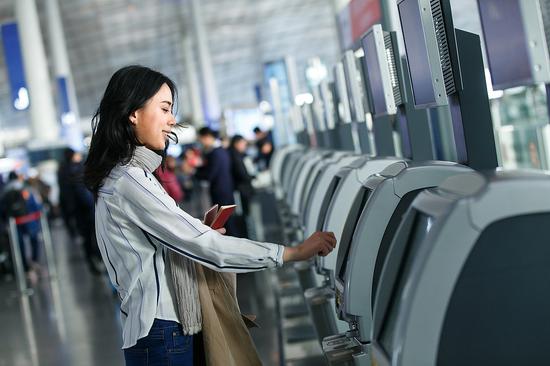Air travel receipts going digital as of December
In a move to streamline the travel process, China plans to roll out digital travel receipts for air passengers starting next month, according to the Civil Aviation Administration of China on Saturday.
The "Electronic Flight Receipt "system will replace paper-based flight itineraries with a convenient, digital alternative, greatly enhancing both travel experiences and facilitating financial reimbursements for individuals and businesses, according to a statement released by the administration.
The statement announcing the new system was jointly released by the State Taxation Administration of China, the Ministry of Finance and the CAAC.
The EFR system will allow travelers to access their electronic receipts for air travel for up to 180 days after completing their journeys via airline websites, mobile apps or customer service hotlines. Corporate clients can also retrieve receipts through tax service platforms to manage VAT deductions and other accounting tasks.
The switch to electronic flight receipts will simplify travel logistics and financial processes, the statement said. For passengers, the EFR system eliminates the need for paper receipts.
Travelers will be able to easily download or print receipts directly from their mobile devices or computers. The system will eliminate the need to endure long waits at ticket counters for paper receipts and the risk of losing travel documentation during business or personal trips.
For businesses, it will reduce paperwork and improve efficiency in the accounting process. Financial departments will benefit from seamless, paperless operations for expense reimbursements, tax filings and archiving.
The electronic receipts can be accessed and downloaded directly from the tax service platform, streamlining VAT deductions and ensuring accurate, real-time accounting. The move will significantly reduce the cost of printing, distributing and storing paper receipts, contributing to both financial savings and environmental sustainability.
To ensure a smooth transition, a dual system will be in place for nearly a year. From Dec 1 to Sept 30 next year, both paper and electronic receipts will coexist, allowing travelers and businesses to continue using traditional paper receipts for reimbursements if needed. However, electronic and paper receipts will not be issued for the same transaction, preventing duplicate claims.
After the transition period, starting Oct 1 next year, paper receipts will no longer be available, and electronic receipts will become the standard for all air travel in China.
The implementation of electronic flight receipts will also help accelerate the digital transformation of the aviation industry, making it more efficient and user-friendly so that it aligns with modern technological trends.
The latest move follows a broader trend of digitalization across the transportation sector in China.
China's rail system is also advancing toward full digitalization. China State Railway Group, the national railway operator, rolled out a nationwide digital invoicing system for railway passengers, starting on Nov 1, offering similar benefits to those of the air travel sector.
Passengers who purchase domestic train tickets, including for cancellations or changes, are able to request an electronic invoice directly from ticket booking system 12306, bypassing the need for paper receipts.
Similar to the airline industry, the railway system's electronic invoices will enable more efficient tax reporting and VAT deductions, benefiting both individual travelers and businesses.
Both the airline and railway sectors' moves to digitalize travel receipts reflect a broader push for modernization and environmental sustainability in China's transportation.

